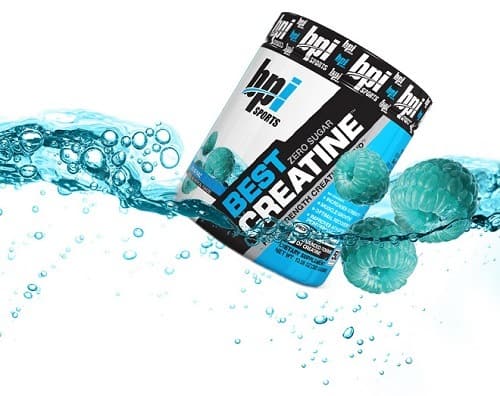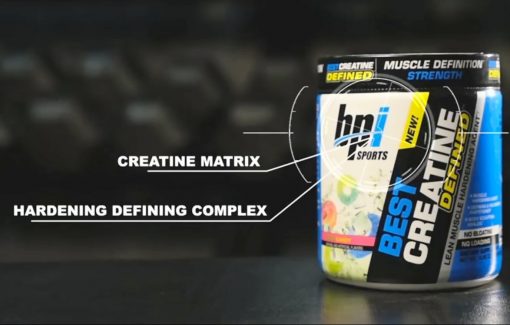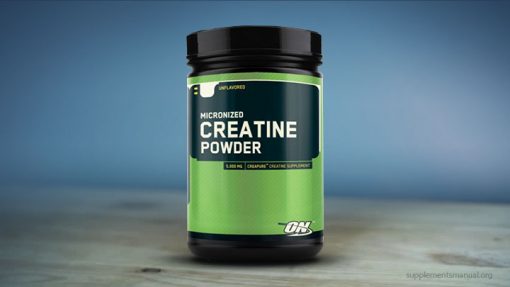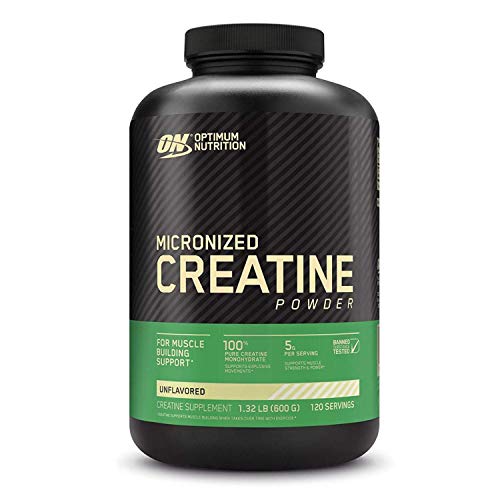The supplement industry is largely unregulated by the FDA. This gives manufacturers the ability to make all sorts of claims about their products that go completely unevaluated. It’s no wonder then that many health and nutrition experts view the entire industry with a skeptical eye. This is accepted and in our view, the right thing to do. Unfortunately, when it comes to supplements, it’s always better to take their claims with at least a couple grains oef salt.
That said, there are many ‘basic’ supplements that work and should be a regular part of any fitness enthusiast’s regimen. For instance, everyone can benefit from a good whey protein, multivitamin, and fish oil supplement, either as a pre-workout supplement or post-workout supplement. That’s because none of these supplements make any bombastic claims and the contents have been well-studied. They provide you with simple protein, multivitamins, and beneficial fatty acids.
There is one supplement that has been just as proven as the basic supplements above. Unfortunately, it is one that slips the mind of many people. That supplement is creatine. In fact, creatine may be one of the best supplements that you are not taking right now, especially if you are a woman.
We don’t mean to over-generalize, but the truth is that women are subjected to various misleading messages about fitness. Just think about the misconception that many women still have that ‘lifting heavy weights would make them bulky’. Or how many of them say they want to ‘get toned’ instead.
The truth is that considering women’s lower levels of testosterone, lifting heavy weights will not make them bulky. Think about how many men are lifting weights and are far from bulky! Further, getting toned is just adding lean muscle mass while stripping fat, something that lifting weights is ideal for! For more about female fitness myths that have been debunked by science, here is a good resource.
Topic Contents
What Is Creatine Anyway?
If you’ve heard of creatine before but are still unsure as to what it is, here’s a quick primer. Creatine is actually a molecule that is already produced by your body. It’s a combination of three different amino acids: glycine, arginine, and methionine.
Creatine is naturally found in high protein foods but is more prevalent in red meat. So please dispel any notions about creatine being some sort of lab-engineered chemical compound or even a steroid! That is false; it is a naturally occurring compound.
Creatine (as phosphocreatine) helps in the regeneration of ATP in your muscles. ATP, or adenosine triphosphate is the ‘batteries of your muscles’. When your ATP is depleted, your energy goes down dramatically. Think of someone grinding to lift a heavy weight, just as he or she is about to reach the top of the lift, you see the strength go out of their muscles and the lift fails. That happens because their ATP is depleted. This is because the ATP-PC system is known as the alactic energy system, which has the highest degree of power but also the shortest duration (about 10 – 15s tops). So when you take too long to finish a lift, your ATP stores run out before the lift can be completed.
If you are interested to read and understand more about our bodies’ energy systems, check out this article.
How Can Creatine Supplementation Help Women?
While many men are already taking creatine, many women remain skeptical. Let’s face it — muscle growth is important for men and women.The first might arise from a misconception of what creatine actually is, which we have explained above. The second is that women may feel that creatine will is a bodybuilding supplement, or that is unnecessary for their fitness goals. Let’s address the second point. Here are two main reasons women can benefit from creatine supplementation just as much as men.
-
Creatine Will Increase Your Power Output and Athletic Performance
Whether you use it as a pre-workout supplement or a post-workout supplement, Creatine will make you stronger. By increasing the level of ATP regeneration in your muscles, you will have a higher level of power output, period. This has been backed up by so many studies that we cannot possibly link them all. But for reference, here are a few of them for you to take a look at. Note that the studies we linked all had women as part of the test subjects.
This means that if you play any type of intense sport at all, your performance will benefit. Volleyball, soccer, tennis, swimming etc. if you are an athlete, there is no reason for you NOT to take creatine.
-
Creatine Helps With Symptoms of Depression
This is a surprising one and very few people know about this benefit of creatine. But it is backed up by research, which shows that daily creatine supplementation decreased depressive symptoms.
More and more women are participating in fitness activities today. Just take a look at the Crossfit Games! The bottom line is — if you are an athlete, recreational or otherwise, or just enjoy working out, then you will benefit from creatine supplementation.
Even if you’re not any sort of athlete, creatine supplementation may benefit one often neglected population group: the elderly. This study showed that creatine supplementation increased functional capacity in elderly women, making it easier for them to perform a task involving rapid movements, particularly involving the lower body.
Finally, if you are a vegetarian, then you definitely should be taking creatine! Vegetables may be able to give you the necessary levels of dietary protein, but it won’t give you enough creatine.
Are There Any Side Effects of Taking Creatine?
Perhaps you’ve heard about all of the positive benefits of creatine, but you’ve also heard of its main side effect: increased water retention and thus body weight. We have to tell you, that yes, there is a good chance you will see your weight go up from water weight if you start taking creatine. This is simply how creatine works, it draws water into your muscles.
But how much water weight will you actually gain? The answer is not a lot at all. Men gain on average about 5lbs when first taking it and women even less. So the question to ask yourself is, isn’t a measly 5lbs (or less) worth the benefits of becoming stronger? Also, keep in mind that water weight is counted as lean mass and not fat mass. Creatine is no fat burner, but rest assured it won’t actually make you fatter.
In addition to the water weight, you might have heard that creatine may have adverse effects on kidney function. This is a straight up myth. Numerous studies have found no effect of creatine supplementation on kidney function.
Finally, there is the minor side effect of possible nausea, mild diarrhea, and cramping during the initial phase of creatine supplementation. Cramping usually occurs if you don’t consume enough water; remember that because creatine draws water into your muscles, you need to consume extra water to compensate. As for nausea and diarrhea, this means that you are taking too much creatine at once, reduce the amount (i.e. skip the loading phase) or spread it out throughout the day.
How Much Creatine Should You Take?
Creatine does not work right away; it takes time for your muscles to build up its creatine stores. That’s why many people follow a loading protocol. This means taking elevated doses of creatine for about a week at about 0.3g of creatine per kilogram of body weight or about 0.15g per pound of body weight.
After the loading phase, you can taper it down to 10% of that amount indefinitely. If you wish to cycle creatine, you can do six weeks on followed by two weeks off and then start a new loading phase after those two weeks. In our opinion, however, cycling creatine is unnecessary.
Also, it is worth noting that most people stick with a 5g per day dose despite the lower recommendation based on body weight. This is because creatine is one of the cheapest supplements around and also due to the perceived benefits of a higher dose. If you have more muscle mass you can take higher doses of creatine. For most women, a daily dosage of 2.5g to 5g of creatine should suffice. The loading phase is also entirely optional.
Which Type of Creatine Should You Take?
The most common form of creatine supplements is creatine monohydrate. This is the cheapest and most common form of creatine and is the one that we and most experts recommend. In all the studies linked above, and in fact all studies conducted on creatine, creatine monohydrate was the form used in the vast majority of them. Hence, its effectiveness is not in question.
Most creatine monohydrate supplements are micronized, meaning the particles are made smaller for better absorption. That said there are a few other more premium options on the market. Let’s take a look at what they are.
- Creatine Nitrate: Creatine nitrate is as effective as creatine monohydrate but more water soluble. While this might make it slightly better for digestion, creatine absorption is largely unaffected by solubility.
- Creatine HCl: The HCl stands for hydrochloride, and the idea is that because it is more water-soluble, it has better absorption. Theoretically, you could then take a lower dose for the same effect and may have less digestive issues. However, to date, no human studies have been carried out showing that creatine HCl is more effective compared to creatine monohydrate.
- Buffered Creatine: This has a higher pH level compared to creatine monohydrate and is supposed to increase its effectiveness. However, a study conducted showed that there was no difference.
- Creatine Ethyl Ester: We do not recommend this one as some studies using creatine ethyl ester has shown it to be less effective than creatine monohydrate, on par with a placebo.
- Liquid Creatine: Also known as creatine serum, studies have shown that this form is less effective compared to creatine powder because creatine breaks down in liquid form.
- Creatine Magnesium Chelate: This version is just as effective as creatine monohydrate but results in lower water weight gain. However, the difference in water weight gain was determined to be statistically insignificant.
Looking at the other types of creatine above, we can see that the advantages that a couple of them may have the standard creatine monohydrate form are few if any. Many supplement manufacturers will, however, charge a premium for these forms of creatine despite their limited advantage over creatine monohydrate.
Hence, our number one recommended form of creatine, for both your wallet and your body, remains creatine monohydrate.
The Top 3 Best Creatine Supplements for Women
By this point in the article, you should be a casual expert on creatine already. You know it’s beneficial, but with all the choices out there, you want to know which the best choice is for you. The fact is that creatine is quite a generic supplement, so any brand that gives you creatine monohydrate should be just as effective as the other.
But instead of giving you three creatine monohydrate products which would essentially be interchangeable with each other, we added some variety to our list. For this list, we selected three different products using three different types of creatine to give you the most options available.
Optimum Nutrition Micronized Creatine Powder
Optimum Nutrition might be best known for the ON Gold Standard Whey Protein, which has become the benchmark of that all whey protein supplements are compared to. But this company has built up a solid reputation for delivering high-quality products at value for money prices, and their creatine offering is no different.
Type of Creatine
Micronized creatine monohydrate.
Serving Size
Each serving size is 5.25g which the label claim delivers 5g of creatine monohydrate. We are not sure why there is this discrepancy, but rest assured that this is a pure creatine monohydrate supplement. Lab tests have shown this product to be 100% creatine monohydrate meaning that each serving delivers a full 5.25g of creatine monohydrate.
Other Beneficial Ingredients
None.
Packaging Size
Available in packaging sizes of 150g, 300g, 600g, 1,200g, or 2,000g.
Value for Money
Fantastic. Based on prices from the official Optimum Nutrition website, each serving of Optimum Nutrition Micronized Creatine would cost between $0.12 (for the 2,000g package) and $0.32 (for the 150g package).
Supports increases in energy, endurance & recovery. Maximum potency supports muscle size, strength, and power. Supreme absorbency micronized to get the most out of each dose.
Taste and Mixability
This is a simple pure unflavored creatine monohydrate product. Mixability might be an issue. In fact, the number one complaint with regards to this product is that it doesn’t dissolve very well in water. Perhaps this is why the label has a serving size of 5.25g but only claims 5g of creatine monohydrate; to account for the undissolved creatine.
Verdict
This is a simple no-frills creatine monohydrate supplement. Nothing more, nothing less. In case you were wondering, it’s also zero calories. It’s unflavored so you can add it to any of your pre or post-workout shakes or even any smoothies.
And as the price per serving shows, it’ll barely make a dent in your wallet. For instance, if you take the 2,000g package, you’ll have a year’s supply of creatine at $45. The only downside about that is that when you keep creatine powder on the shelf for an extended period of time, it tends to harden and clump, making it even harder to dissolve. This is particularly true if you live in humid areas, so keep that in mind before choosing your packaging size.
Pros
- 100% pure Creatine monohydrate
- Fantastic value for money
Cons
- Doesn’t mix easily, especially if left on the shelf for a while
BPI Sports Best Creatine
BPI Sports Best Creatine doesn’t take any sides as to which creatine is the most effective or best form of creatine; it just uses all of them! This flavored creatine product is a blend of six different forms of creatine, including, of course, creatine monohydrate.
Type of Creatine
A proprietary blend of creatine monohydrate, creatine anhydrous, creatine magnesium chelate, creatine phosphate, creatine AKG, and buffered creatine.
Serving Size
Each serving size is 6g and contains 4g of the above creatine blend, 500mg of betaine anhydrous, and 50mg of Himalayan pink salt.
Other Beneficial Ingredients
Betaine anhydrous is betaine with the water molecule removed. Betaine, also known as trimethylglycine is found in beetroot and works well alongside creatine. Betaine can reduce levels of homocysteine, which is a non-protein amino acid. Lowering homocysteine levels may lead to lower risk of heart disease although the link has yet to be robustly proven.
Further, betaine has also been shown to decrease cortisol (the stress hormone), increase growth hormone levels post-exercise, and improve exercise performance via increased muscle oxygenation. As for Himalayan pink salt, it contains 84 different minerals and trace elements. The claim is that it is more beneficial for the human body, but this has yet to be supported by any direct research.
Packaging Size
Available in packaging sizes of 50 or 100 servings, powder form only.
Value for Money
Using prices from BPI Sports official websites, the price per serving would be $0.62 for the 50 servings package and $0.50 for the 100 servings package. Keep in mind that all creatine products that are more than just pure creatine monohydrate will always cost a premium.
Taste and Mixability
This is a flavored product and you will have a choice of three flavors: Fruit Punch, Icy Blue Raz, and Lime Sherbet. It is sweetened using sucralose and acesulfame-k. Some people prefer not to consume acesulfame-k as it breaks down into acetoacetamide, which is toxic in large doses.
That said, the levels found are far too low to be toxic but some people prefer not to take the chance. While plenty of research has shown that acesulfame-k is safe for animals, human studies are rare.
Many users have reported that this product is very sweet, which may be a plus or minus depending on your own tastes. If you have a sweet tooth, you’ll probably love the flavor of this one. Mixability is also good and the majority of users had no problem dissolving this in water.
Verdict
As a premium creatine product, you are paying anywhere from two to five times the per serving cost compared to a pure and simple creatine monohydrate product. Nonetheless, this creatine blend is likely no less effective than creatine monohydrate (which is part of the blend) and may even have some additional benefits such as better digestion and less water retention (although this is unproven).
What we do like is the inclusion of betaine, a proven substance that has been shown to boost exercise performance. The Himalayan pink salt is a nice addition, but we doubt that it really does much. Finally, if you have been put off supplements because of their poor taste, then this one may be just up your alley.
To conclude, this is a high-quality premium creatine supplement that contains additional beneficial ingredients. If you are willing to pay a premium, you can’t go wrong with this product.
Pros
- Mix of 6 different creatine blends
- Sweet flavor
Cons
- Costs more than regular creatine monohydrate
- Contains acesulfame-k
Promera Health Con-Cret
Pure creatine monohydrate is the standard in the creatine supplement industry and is definitely the most proven. However, sometimes you might simply get frustrated at its lack of water solubility and are tired of seeing clumps of white powder at the bottom.
So, in this case, we are recommending a Creatine HCl supplement. As we mentioned above, creatine HCl is more water soluble compared to creatine monohydrate although this does not imply increased effectiveness once ingested.
Type of Creatine
Creatine Hydrochloride
Serving Size
Each serving size delivers 750mg of creatine hydrochloride. Lab tests have shown that each serving actually contains 770mg of creatine hydrochloride, slightly above its label claim. You can purchase this product either in powder or capsule form.
Other Beneficial Ingredients
None.
Packaging Size
Available in packaging sizes of 24 or 48 servings for the powder form and 48 servings for the capsule form.
Value for Money
Based on prices from the official Promera Sports website, one serving of Promera Health Con-Cret would cost either $0.69 for the 24 serving size or $0.58 for the 48 serving size. Keep in mind that each serving only contains 750mg of creatine HCl. When compared to 5g of creatine monohydrate typical in other creatine supplements, it is clear that this is far more expensive.
Taste and Mixability
As a premium product, the powder version of Promera Health Con-Cret comes with seven flavor options: blue raspberry, lemon lime, fruit punch, pineapple, snake fruit, watermelon, and unflavored.
The flavor is artificial and the sucralose is used to sweeten the product. While no studies have shown any dangers on sucralose, you should know that some studies have found a link between sucralose intake and migraine headaches.
For mixability, the powder version of this product mixes well, as is to be expected from a creatine HCl product. Of course, if you take the capsule version, then that becomes a moot point.
Verdict
If for one reason or another you simply cannot stomach creatine monohydrate, then you can try out this creatine HCl product. As we must stress again, there are no conclusive studies demonstrating that it causes less water retention and bloating compared to normal creatine monohydrate. That said, from a theoretical perspective, your digestive system may find creatine HCl more acceptable, though that is no guarantee.
As you can see, it costs far more compared to a creatine monohydrate supplement while simultaneously delivering far less creatine. It is the most expensive creatine product on this list. Therefore, the only reason for you to take this product would be if regular creatine monohydrate gives you cramps or other digestive issues.
That being said, for a creatine HCl product, you really cannot go wrong with Promera Health Con-Cret.
| Pros | Cons |
| Dissolves easier in water | Very expensive |
| May cause less water retention and bloating | Less creatine per serving |
Q&A
Is taking creatine a good idea?
Whether or not you should take creatine depends on your goals
– Creatine is an organic acid produced in the liver. What it does is help supply energy to cells throughout the body.
– ATP is the chemical source of energy for muscle contraction and quick energy. Creatine is a source of this ATP energy in muscle tissue.
– Studies have shown that Creatine can increase the performance of an individual in activities that require bursts of energy, such as sprinting and weightlifting.
Can creatine help to lose weight?
In your cells, creatine is stored as creatine phosphate. Normally your body uses glucose (sugar) as quick energy, but there is a slight delay before it can convert the glucose so that it’s usable by your cells.
So when your body needs energy quickly (as in power for the first few reps), the creatine “donates” its phosphate to the ADP, which becomes ATP and your cells have a little bit of extra energy.
Creatine increases the workout intensity and it also allows you to have a better sprint performance which increases the total energy expenditure- good for weight loss and gaining muscle mass.
Comparison
| Brands | Type of Creatine | Serving Size | Price |
|---|---|---|---|
| Optimum Nutrition Micronized Creatine Powder | Micronized creatine monohydrate. | Each serving size is 5.25g which the label claim delivers 5g of creatine monohydrate | $10.33 for 100 capsules (Check here for the latest prices!) |
| BPI Sports Best Creatine | A proprietary blend of creatine monohydrate, creatine anhydrous, creatine magnesium chelate, creatine phosphate, creatine AKG, and buffered creatine. | Each serving size is 6g and contains 4g of the above creatine blend, 500mg of betaine anhydrous, and 50mg of Himalayan pink salt. | $23.99 for 100 servings (Check here for the latest prices!) |
| Promera Health Con-Cret | Creatine Hydrochloride | Each serving size delivers 750mg of creatine hydrochloride. | $27.99 (Check here for the latest prices!) |
Alt Protein Team is a team of professionals and enthusiasts committed to bringing you the most up-to-date information on alternative protein, health and wellness, workouts, and all things health-related. We’ve reviewed a lot of products and services so you don’t have to guess when you spend your hard-earned money on them. Whether you want to shed some pounds, build lean muscle or bulk, we can help you figure out what you need to do and what you need to have to achieve your goals.














I love your blog and I totally agree! Thanks for sharing this information on weight loss supplements for women. Have a great day!
Hi Healthy Moms Mag,
Thanks so much for your kind words! I’m glad you’re finding the blog useful.